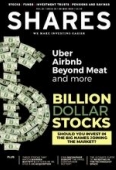Archived article
Please note that tax, investment, pension and ISA rules can change and the information and any views contained in this article may now be inaccurate.
Grab global growing dividends with Securities Trust of Scotland

‘We go global to hunt down the best, most sustainable income ideas,’ says Mark Whitehead, manager of the quarterly-dividend paying Securities Trust of Scotland (STS).
This is an investment trust generating a geographically diverse source of income from a carefully selected cohort of high quality businesses.
With average retirement in the UK expected to last 19 years, this trust should be front of mind for savers seeking to accrue a reassuringly large pension pot and protect their income against inflation.
Securities Trust of Scotland is in fact one of Shares’ running Great Ideas selections and we recently jumped at the chance of a catch-up with the manager, Martin Currie’s head of income Whitehead, in order to check up on the progress of the portfolio. Read our original article here.
NOT BENCHMARK DRIVEN
The fund’s objective is to achieve rising income and long-term capital growth through a balanced portfolio of global equities; this is a focused 35 to 55 stock portfolio that is unconstrained by geography, sector, stock or market capitalisation.
Whitehead prefers the term ‘benchmark agnostic’ to ‘unconstrained’ and benefits from the flexibility to invest in his best ideas from around the world.
A global equity income portfolio provides more choice than a country specific income portfolio and avoids the risk of income concentration.
All the stocks in the portfolio, well diversified across sectors and countries, should exhibit a combination of attractive dividend yield and dividend growth.
‘The trust was really set up as a savings solution and the main objective is to produce a high income, and grow that income stream at least in line with inflation,’ explains Whitehead.
He believes savers ‘need to buy a trust that has global exposure because global will outperform and you really need to own more equities – more “growth assets” – in your portfolio.’
At pains to point out the risk of purchasing stocks purely for high yields, since these are often the precursor for a dividend cut, he says: ‘What I try and do is invest in growth companies. We really believe high quality businesses that are able to generate strong and sustainable returns on invested capital are often managed well, they are high quality companies that will generate strong dividend growth and they are committed to that dividend.’
MARTIN CURRIE – AN ESG LEADER
Whitehead’s robust investment approach involves proprietary screening of stocks, detailed evaluation of companies and includes credit analysis to determine the sustainability of cash flows and the ability of the balance sheet to withstand adverse scenarios.
ESG (environmental, social and governance) factors are an essential input into his investment management process, because he believes that positive behaviour exhibited by companies in these areas will add shareholder value over the longer term.
Stewardship factors are an integral part of Martin Currie’s investment philosophy and process and the investment manager has been a signatory of the Principles for Responsible Investment (PRI) since 2009.
‘We integrate ESG all the way through our investment process,’ insists Whitehead. ‘When we’re looking at a company, all the time we are asking questions – do we think the management is high quality? Are they investing sustainably? We talk to management teams all the time about their sustainable footprint.’
One portfolio example is Dutch health, nutrition and materials multinational DSM, offering exposure to the structural growth themes of nutrition, health and sustainable living.
‘DSM has put together a bank debt with a syndicate of banks and the coupon that they have to pay is directly linked to their carbon emissions,’ explains Whitehead. ‘So if they hit their targets to lower emissions, then they have to pay less for that debt. It is good for the profit and loss.’
Whitehead is also able to generate additional income for the trust by selling derivative contracts known as ‘puts’ in the stocks on his buy list.
By selling a put option Whitehead essentially takes on an obligation to an option buyer to buy the security at a predetermined price, which is typically lower than the prevailing share price.
Part of the reason this is lucrative is thanks to the put options market predominantly being used by investors who buy put options as an insurance policy for stocks they already own and whom are willing to pay a large premium to guarantee a set sale price for their stock in volatile markets.
DEDICATED TO DIVERSITY
Diversified by country and industry, Securities Trust of Scotland also holds the likes of healthcare giant Merck, owned for its superior market positioning in immuno-oncology and other growth-orientated products, as well as UK clay brick maker Ibstock (IBST), viewed by Whitehead as a play on structural demand for housing.
Also in the portfolio are US-listed consumer goods powerhouse Procter & Gamble and food conglomerate Danone, the yoghurt maker which has made a number of acquisitions in recent years including WhiteWave Foods, a deal adding a new growth dimension in international plant-based products.
BAD APPLE?
Among Securities Trust of Scotland’s recent sales is iPhone maker Apple, despite the company jockeying for the title of most valuable US company with Amazon and Microsoft, in a demonstration of the manager’s strict sell discipline amid concern over its growing reliance on services revenue.
Important information:
These articles are provided by Shares magazine which is published by AJ Bell Media, a part of AJ Bell. Shares is not written by AJ Bell.
Shares is provided for your general information and use and is not a personal recommendation to invest. It is not intended to be relied upon by you in making or not making any investment decisions. The investments referred to in these articles will not be suitable for all investors. If in doubt please seek appropriate independent financial advice.
Investors acting on the information in these articles do so at their own risk and AJ Bell Media and its staff do not accept liability for losses suffered by investors as a result of their investment decisions.

 magazine
magazine










